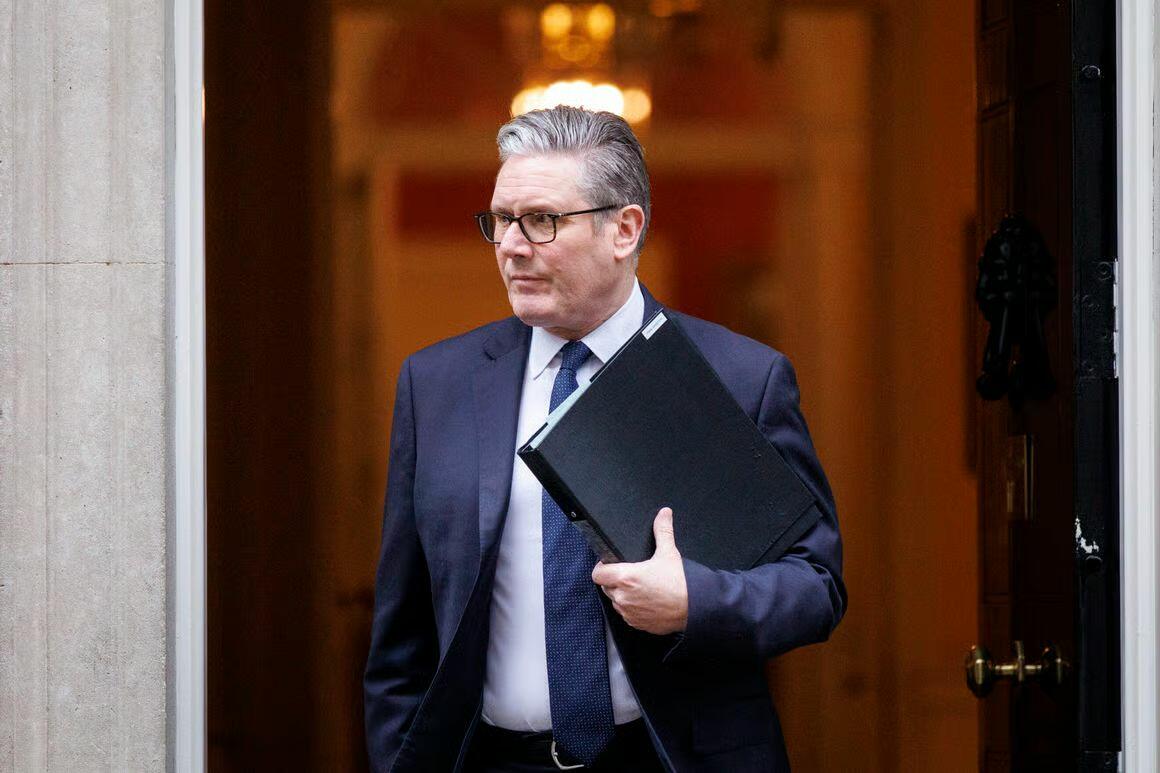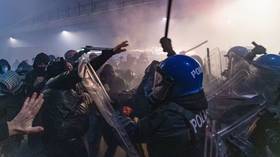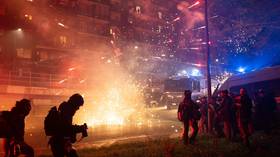
China A Leading Perpetrator Of Transnational Repression In 2024: Freedom House
Authored by Alex Wu via The Epoch Times (emphasis ours),
The Chinese communist regime remained a major perpetrator of transnational repression in 2024, according to the latest data released by the U.S. human rights organization Freedom House.
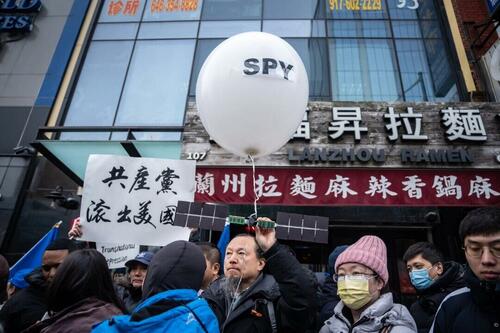 People at a press conference and rally in front of the America ChangLe Association, a now-closed secret Chinese police station, highlighting Beijing’s transnational repression, in New York City on Feb. 25, 2023. Samira Bouaou/The Epoch Times
People at a press conference and rally in front of the America ChangLe Association, a now-closed secret Chinese police station, highlighting Beijing’s transnational repression, in New York City on Feb. 25, 2023. Samira Bouaou/The Epoch TimesThe Washington-based nonprofit organization recorded 23 governments and regimes perpetrating 160 incidents of physical transnational repression across 34 countries in 2024, the organization said in a Feb. 6 statement. Methods used by authorities in these countries included assassinations, abductions, assaults, detentions, and unlawful deportations.
The Chinese regime was one of the leading perpetrators along with Uganda, Cambodia, Russia, and Iran in 2024, the organization said. The transnational repression targeted exiled political activists, journalists, former regime insiders, and members of ethnic or religious minorities, according to the Freedom House report.
The report recorded 1,219 incidents of direct, physical transnational repression between 2014 and 2024. The Chinese regime “remains the most prolific perpetrator, committing 272 incidents, or 22 percent, of recorded cases” in the past decade, according to Freedom House researchers.
“Transnational repression continues to threaten democracy, freedom, and security globally,” Yana Gorokhovskaia, research director for strategy and design at Freedom House, said in a statement.
Lai Rongwei, CEO of the pro-democracy nonprofit Taiwan Inspirational Association, told The Epoch Times on Feb. 8 that “the Freedom House report feels very real and credible” to him.
“Because Taiwan is at the forefront of China’s threats, China’s various means of infiltration against Taiwan are currently taking place in Taiwan and becoming more and more severe,” he said.
Lai said that since 2019 and 2020, after the Chinese regime’s violent suppression of Hong Kong’s pro-democracy “anti-extradition law” movement, many Hong Kong people have gone to Taiwan to escape the Chinese Communist Party’s (CCP’s) surveillance and persecution.
“During events held by some Hong Kong associations in Taiwan and events commemorating the June 4th Tiananmen massacre in Taiwan, you can see many of the CCP-supported and pro-China groups come to the scene to cause trouble,” he said.
Lai said that his organization has long observed the CCP’s transnational repression and that the regime employs both formal and informal methods to carry out overseas repression.
“The formal [methods use] diplomatic and economic means, such as economic sanctions, trade sanctions, and economic aid, to force the governments of other countries to follow China’s position,” he said.
The Chinese regime also uses technological means to target overseas dissidents, such as monitoring their online activities and hacking their phones, Lai said.
The CCP also dispatches China’s national security agents to track down their so-called enemies overseas, according to Lai.
“They also use local agents in some pro-China groups in the local societies of various countries, including spies and informants that they’ve developed. The local agents may also be some pro-China people in society who have been bribed by the CCP for a long time,” Lai said. “These people are there to help increase the CCP’s influence locally. And they go to various occasions and events to harass and counter those who they think are unfriendly to China. Many people, from politicians to civilians, have been harassed by them.”
In 2022, it was revealed that the CCP had set up secret police stations in Western locations, including New York City, to carry out transnational repression against dissidents, human rights activists, and religious minorities.
There are also reports that CCP agents have sent threats, including bomb threats, to theaters worldwide to intimidate them into not hosting Shen Yun, a performing arts show that showcases traditional Chinese culture before communism. The show is performed by a New York-based performing arts company.
 Shen Yun Performing Arts’ curtain call at Mesa’s Segerstrom Center for the Arts in Orange County, Calif., on Dec. 31, 2021. Ji Yuan/The Epoch Times
Shen Yun Performing Arts’ curtain call at Mesa’s Segerstrom Center for the Arts in Orange County, Calif., on Dec. 31, 2021. Ji Yuan/The Epoch Times“A large number of Chinese people have fled China. Some are economic criminals escaping with large sums of money; some are political dissidents; and some come abroad because they know state secrets or technological secrets,” Yeau-Tran Lee, an adjunct professor at the National Chengchi University in Taiwan, said of various people that have left China in recent years.
“In order to implement its long-arm repression, China has resorted to every possible means, including using national security and intelligence agencies, to target these people,” Lee told The Epoch Times on Feb. 8.
Every system within the CCP needs political achievements to make money and expand, Lee said.
“The CCP has so many intelligence and security agents. After Hong Kong’s pro-democracy movement was put out in 2019, a large number of the CCP’s agents were transferred overseas, which has increased the CCP’s transnational repression in other countries,” he said.
In terms of the effect of the CCP’s transnational repression, Yao-Yuan Yeh, professor of political science and international studies at the University of St. Thomas in Houston, said that “it makes people feel that China’s spies are not only in China but also abroad everywhere.”
“This can produce a chain effect, silencing those who may be dissatisfied with the Chinese regime abroad, whether they are Chinese or foreigners today, and preventing them from speaking out on the internet. This creates self-censorship through the terrorizing actions [of transnational repression],” Yeh told The Epoch Times on Feb. 9.
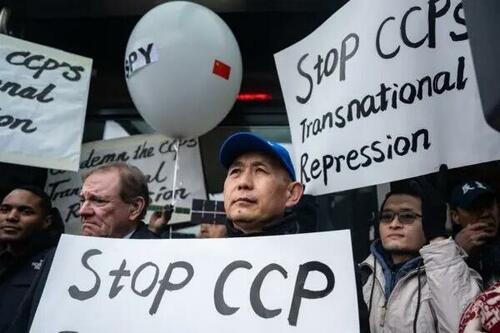 Chinese dissident Wang Yonghong at a press conference and rally to highlight Beijing’s transnational repression, in New York City on Feb. 25, 2023. Samira Bouaou/The Epoch Times
Chinese dissident Wang Yonghong at a press conference and rally to highlight Beijing’s transnational repression, in New York City on Feb. 25, 2023. Samira Bouaou/The Epoch TimesAs for the countermeasures against the CCP’s transnational repression, Yeh said that “each country needs to consciously prevent or reject the CCP’s transnational repression in their country.”
On an international scale, Yeh said that the United Nations and other international organizations should strongly condemn transnational repression.
“In international relations, when there’s [a] human rights violation, the most important thing to do is to speak out to expose it, telling all other countries how many evil things this country has done,” he said.
Luo Ya contributed to this report.
Tyler Durden
Tue, 02/11/2025 – 22:35

